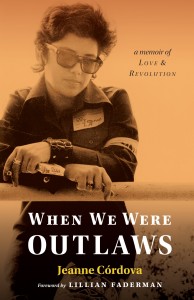 When We Were Outlaws: A Memoir of Love and Revolution
When We Were Outlaws: A Memoir of Love and Revolution
by Jeanne Córdova
Spinsters Ink. 456 pages, $14.95
REMEMBER the kidnapping of newspaper heiress Patricia Hearst by a group of self-styled revolutionaries, the Symbionese Liberation Army? Remember the music of Olivia Records, the all-woman recording company of the 1970’s that launched a new generation of lesbian singer-songwriters such as Meg Christian, Margie Adam, and Lucie Blue Tremblay? Jeanne Córdova was a young journalist and political activist in Los Angeles at the time, and she’s written a gripping account of her experiences. As human rights editor of “the Freep” (The L.A. Free Press) and founder of The Lesbian Tide (1971–1980), Córdova covered the major political and cultural events of this era. These in turn form the background for a dramatic lesbian love affair. Each chapter of this thick book has a “dateline” in 1974 or 1975, but the entire narrative reads like a novel.
Córdova describes herself as a “centrist” in the context of the New Left, gay rights, and the lesbian-feminist politics of the 70’s. Like many of her contemporaries, she left home in her late teens when she could no longer hide her sexual identity (lesbian and butch) from her conservative parents. As she explains, replacing her lost family with a chosen “family” of sister-dykes and compatible gay men was a practical and emotional necessity. She describes a fledgling gay community in the process of inventing itself.
Córdova appears in this memoir as a remarkable mixture of naïveté, clear-sightedness, and community spirit. The story of the author’s affair with “Rachel,” a recently divorced newbie in the urban lesbian community, is told in painful detail. From their first kiss (in public, surrounded by lesbian demonstrators), the author’s non-monogamous living arrangement and her full-time commitment to radical journalism clashed with Rachel’s need for security. When Rachel adopted non-monogamy for herself—in keeping with the credo of liberationist feminism—it didn’t go over too well. Córdova is unflinching in describing her jealous rage when Rachel appeared at social events with another butch lesbian (though butch and femme roles were widely regarded as patriarchal and outdated). Like many another activist, the author found that political theory and emotional reality were separate and often opposed.
The author’s frequent contact with outlaws in the most literal sense—self-defined revolutionaries running from the FBI—forced her to think about the uses of violence. Invited to join “the revolution,” which took different forms in the minds of different radicals, she considered whether she could use a gun to hasten the process of social change. For a while, she honestly couldn’t answer that question.
The author’s sense of spiritual connection with Rachel is movingly described. In general, Córdova seems to have been unusually attuned to the natural world and to the “vibes” of other people, both as individuals and in groups. Her apparently inborn spirituality helps account for her early desire to become a nun as well as her eventual disillusionment with organized religion. Rachel’s sense of connection with Córdova is convincingly expressed in dialogue. In an epilogue, the author thanks her for permission to tell their story in print. The conflicts and the cultural gap between them at the time are described with fairness and sensitivity.
The style and pacing of this memoir make it much more than a historical account of a particular time and place. It resembles a haunting song in which the personal and the collective are playing richly interwoven parts.
________________________________________________________
Jean Roberta is a widely published writer based in Regina, Saskatchewan.





